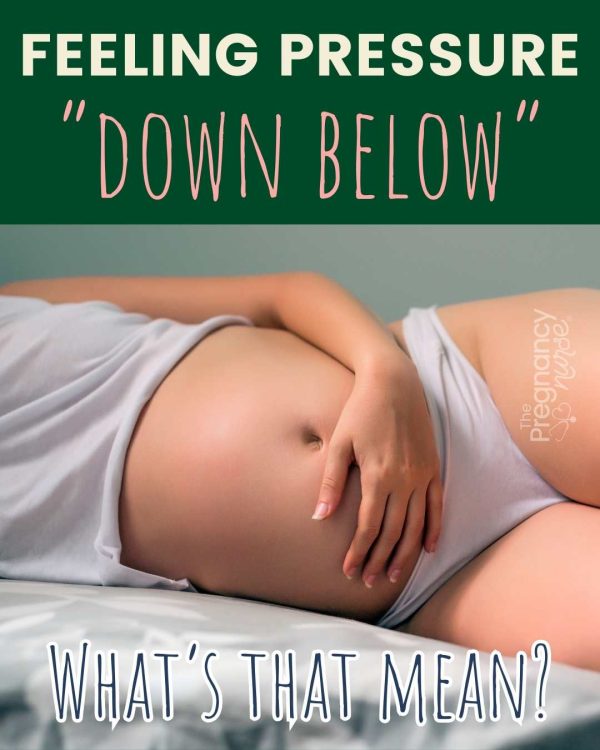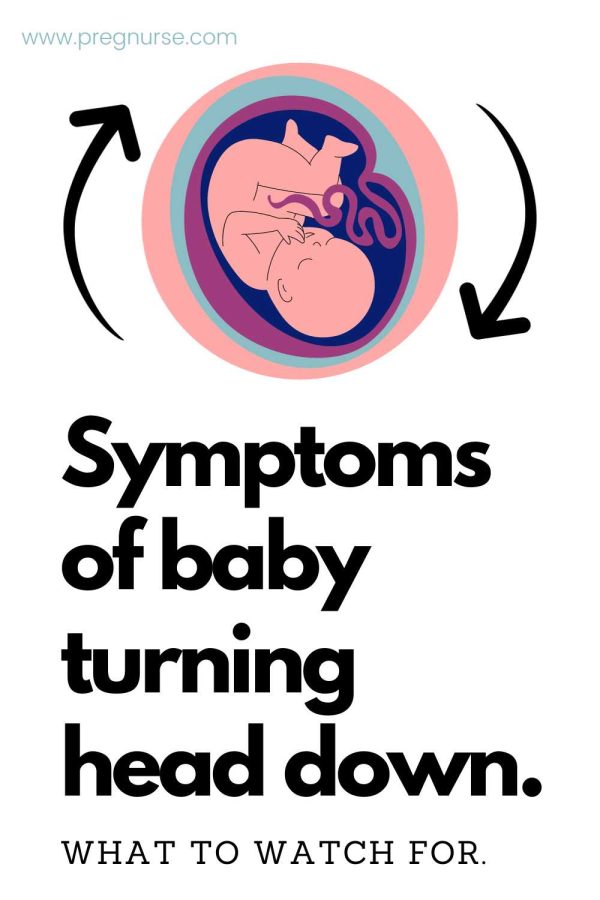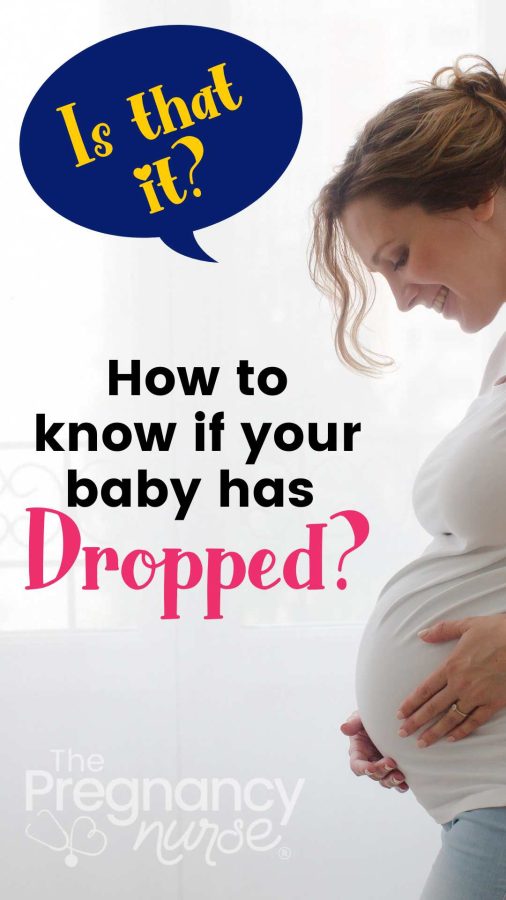Feeling like baby is REALLY moving into your birth canal as you get further into your pregnancy? This is normal and is usually caused by the baby’s head pressing down on your cervix. I’ll be the first to say that it is also SUPER uncomfortable! You may also experience some pelvic cramping as your muscles stretch to accommodate your growing baby. Don’t worry – these symptoms are just signs that labor is getting closer! In this post we’re going to explain some common reasons for the pressure, if there’s anything you can do about it and when you should talk with your provider.

Before we get started, if baby feels low – it’s time to think about birth! Have you made your birth plan? Let me help you out:
What could be causing the pressure down below at 36 weeks pregnant
The pressure down below at 36 weeks pregnant is likely caused by the baby’s head pressing on your cervix as they prepare to enter the birth canal. This is perfectly normal and a sign that labor is getting closer! Other you may start to have other signs of labor, along with the pressure.
If you are having any other symptoms that concern you, be sure to contact your doctor. They can help determine if what you are experiencing is normal or a sign of something else.
But I will say that this is a SUPER uncomfortable feeling. To have something pressing, and MOVING right in your lady bits really weirded me out (especially on my first). So, if that’s you — you’re not alone.
I felt like symptoms like this always made me worry like something was wrong because it sure as heck didn’t feel like anything I’d felt before.
Of course, feelings like that didn’t just stop with pregnancy symptoms, I wondered that throughout my labor. When I learned so many valuable lessons in here I felt confident, not worried. I also love that you can do it from your couch in just a few hours!
Could it be baby’s head pressing on your bladder
It is possible that the baby’s head could be pressing on your bladder, causing you to feel pressure down below.
This is called fetal occiput anterior (FOA). This means that baby is now facing down instead of up (it’s turned) and that bony prominence is running into your bladder. This occurs as the baby moves into position for delivery. It doesn’t always mean that labor is imminent, but hopefully soon!
Other symptoms of FOA include frequent urination and difficulty emptying your bladder completely. If you are having any of these symptoms, contact your doctor to discuss. They can better assess whether you are experiencing FOA or some other issue. In either case, they will offer advice on how to best manage the situation.
This would be a time that you’re more prone to bladder infections, so be mindful of any other bladder symptoms (burning, peeing more frequently or flank pain).
Bladder infections can be easy to confuse with labor — so grab my signs of labor here to help you know what is up:
Are you constipated or hemorrhoid-prone?
It is possible that constipation or hemorrhoids may be causing the pressure down below at 36 weeks pregnant.
Your vagina and your rectum are so close, it can be hard to know which one is the problem.
Constipation occurs when your bowels are unable to move stool through your digestive system, resulting in hard and dry stools that can cause discomfort. This can happen more frequently if you are taking iron supplementation.
Hemorrhoids occur when swollen veins form around the anus, creating lumps which may be painful when passing stool. If you think either of these conditions may be causing your pressure, speak with your doctor who can provide advice and treatment.
In the meantime, eating a high-fiber diet, drinking plenty of water, and continuing to move as much as you can will help keep constipation at bay.
Additionally, avoiding activities that put strain on the area such as sitting or standing for long periods of time can help reduce the swelling associated with hemorrhoids.
Finally, ensure you are taking regular bathroom breaks and avoid straining to pass stool. If constipation or hemorrhoids persist, your doctor may suggest additional treatments such as fiber supplements or ointments.
And, if you think hemorrhoids are the issue, I’d definitely talk with your provider at your next appt. There are a few things they can prescribe, or tell you that may help a lot.
Pro Tip: DO NOT feel weird talking to your provider about stuff like this. We do it ALL the time and it’s not weird AT ALL for us. We really want to make you as comfortable as possible!
Want to know about other pregnancy pains? — check out these posts:
- Charlie Horses in Pregnancy: What you can do to prevent them?
- What to Do If You are in Pain During Pregnancy
- Prodromal Labor: What is it and how to avoid it?
- Bladder Infections in Pregnancy
- The WORST Parts of Pregnancy
What is Fetal Lightening?
This is another word that they sometimes use for baby “dropping” into the pelvis.
Fetal lightening, also known as engagement or dropping, is the process in which the baby’s head moves down into the pelvis.
It usually occurs in late pregnancy, close to labor and delivery, but can happen at any time. This can cause an increase in pressure on your bladder and cervix. You may experience more frequent urination, pelvic cramping, and a decrease in abdominal pressure.
Some women just carry their baby lower than other women, and that may last for a few weeks. You may want to try pelvic support straps if that is the case.

How to tell if it’s just normal pressure or something more serious
If you are feeling pressure down below and it is causing you discomfort, contact your doctor.
They can help determine if the pressure is normal or a sign of something more serious. Your doctor will likely assess your symptoms and do an internal exam to make sure everything is progressing correctly.
If there are any issues, they can take steps to ensure that your baby is safe and healthy. In any case, they will be able to provide advice on how best to manage your symptoms.
I always felt worried and silly bringing up stuff like this to my provider, until I learned in here that asking questions like that is VERY normal and actually encouraged!
It was honestly a game-changer for me. I felt so much more free to ask my provider those questions that were really weighing me down day to day.
What you can do to relieve the pressure?
To relieve the pressure you are feeling, try taking a warm bath or shower. This can help to relax your muscles and reduce any cramping or discomfort.
I am a big fan of stretching and prenatal yoga to help tired muscles that hold up your pelvis and baby all day.
Two things that help a lot of women in this situation:
- Getting on all 4’s (cat to cow stretch in yoga too) — this changes how baby lays on your pelvis and can give you some relief. It also helps stretch out those back muscles if you do cat to cow (I have a post on core exercises during pregnancy that might have some helpful info also).
- Being in a pool — baby will weigh a lot less in the pool and women love the floating feeling of not carrying around that weight.
Make sure to get plenty of rest and stay hydrated. Don’t be afraid to take breaks and rest your weary pelvis. It’s a lot.
Pains of pregnancy getting you down — check out these posts:
- To The Mom Who Thinks She’ll Go Early.
- What Does Round Ligament Pain Feel Like
- What To Do If You’re Miserable At The End Of Your Pregnancy
- Sharp Abdominal Pain During Pregnancy
- 6 Easy Ways To Get Relief From Hip Pain During Pregnancy
When will my baby drop?
It’s hard to predict when your baby will “drop.” Some babies arrive early and some come late. If your baby is born on his or her due date, he or she will have likely dropped into the pelvis a few weeks before labor begins.
However, if you are carrying a large baby or if this is your first pregnancy, your baby may not drop until you are in labor.
Personally, my babies don’t drop until right before delivery, and I had all vaginal deliveries. I just carry high.
However, baby dropping is a good sign to pack that hospital bag…. (just in case)
What does it feel like when the baby drops?
When the baby drops, it means that the baby’s head is engaged in the pelvic bones. This can happen a few weeks before labor, or during labor itself. Some women may feel pressure in their pelvis when the baby drops. Others may feel a sense of relief. Baby dropping may also cause contractions to become more intense.
The main symptom I hear is that women feel like they can “breathe better” as baby is lower and your lungs have more room to breathe.

Commonly Asked Questions About 36 Weeks Pregnant
If you are 36 weeks pregnant, you are in the final month of your pregnancy. This is an exciting time as you prepare for your baby’s arrival. You may be wondering what to expect in the coming weeks.
I have a few posts that address pregnancy around this time:
In my post on 37 weeks with lots of movement and pressure I share why you may feel baby moving even more as they descend into your pelvis.
Are you feeling cramping? My post on 37 weeks with period pains talks about cramping and why you might feel like your period is coming soon.
Has your provider said you’re dilated? In my post on being 36 weeks and 1 cm dilated I share if this is a sign of labor, or just normal pregnancy stuff.
If your back is hurting, I have a post on being 36 weeks and having backache on and off.
And, if your provider has mentioned the possibility of an induction I have a post on 37 week inductions that is really helpful to explain what to expect if that is the case.
If you are feeling overwhelmed, don’t hesitate to ask for help from family and friends. They can lend a hand with household chores or simply provide moral support as you count down the days until your baby arrives.
I know I needed the support like a good prenatal educator. I wish this was available back when I had my kids, it’s so helpful!
What you need to know at 36 weeks pregnant
Your baby is continuing to grow and develop. At 36 weeks, they are about the size of a watermelon and weigh around 5-5.5 pounds. They are also starting to put on fat which will help them regulate their body temperature after birth.
Baby is going to grow a LOT during these next few weeks.
You may be feeling uncomfortable at this stage of your pregnancy. You may have trouble sleeping due to the size of your belly and frequent trips to the bathroom. You may also be feeling anxious about the upcoming birth.
It is important to stay active during this time and to eat healthy foods. Walking is a great way to stay active while also helping to ease some of the discomfort you may be feeling. Eating healthy foods will help you and your baby get the nutrients you need.
And, studies show that anxiety can certainly be helped by a prenatal class. The Online Prenatal Class for Couples can be done in just a few hours and will help you to feel more confident going into your birth.
And, if you’re not quite sure you’re ready for that whole thing, check out my free prenatal class. It’s your first step toward getting in the driver’s seat of your birth.
Don’t miss my super helpful post all about the signs of labor. Great info for pregnancy!








 Where do You Feel Contractions?
Where do You Feel Contractions?
